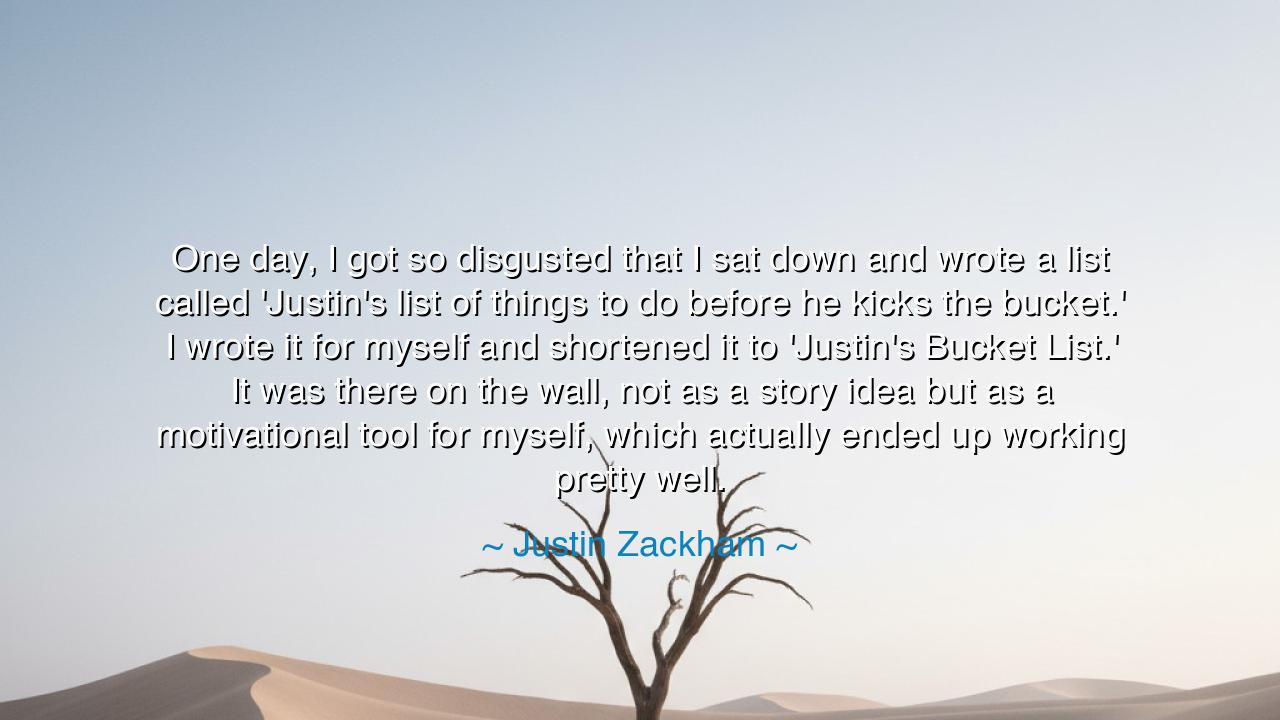
One day, I got so disgusted that I sat down and wrote a list
One day, I got so disgusted that I sat down and wrote a list called 'Justin's list of things to do before he kicks the bucket.' I wrote it for myself and shortened it to 'Justin's Bucket List.' It was there on the wall, not as a story idea but as a motivational tool for myself, which actually ended up working pretty well.






In the words of Justin Zackham, the writer who gave birth to a phrase now known throughout the world, we hear both frustration and renewal: “One day, I got so disgusted that I sat down and wrote a list called ‘Justin's list of things to do before he kicks the bucket.’ I wrote it for myself and shortened it to ‘Justin's Bucket List.’ It was there on the wall, not as a story idea but as a motivational tool for myself, which actually ended up working pretty well.” From disgust was born determination, from despair a vision, and from a simple wall-hanging, a legacy that touched millions. Here, then, is the origin of the Bucket List, not as a clever phrase for entertainment, but as a cry of the human heart yearning to live fully before the shadow of death arrives.
When Zackham grew weary of his own drifting, he did what the ancients counseled: he made visible his intent. He transformed vague desire into specific goals, written clearly, staring back at him each day. In doing so, he reminded himself that time is fleeting, that death waits for no man, and that the greatest tragedy is not in dying, but in dying with dreams unfulfilled. The ancients would say: a man without a vision is like a traveler with no destination—he walks much, but he arrives nowhere. The Bucket List was not a story idea; it was a covenant with himself, a map of actions to give shape to his life.
History too holds the echo of such lists. Consider the journals of Benjamin Franklin, who at a young age wrote down his “13 virtues” to live by. He did not trust memory or vague intention; he carved them into words, measured his conduct by them daily, and sought improvement one virtue at a time. Like Zackham, Franklin understood that writing transforms the unseen into the tangible, and the act of setting goals upon paper is the act of binding oneself to destiny. His success as a statesman, inventor, and thinker was not born of chance but of discipline, sharpened by his written code.
The disgust that Zackham felt before creating his Bucket List is familiar to many: it is the ache of unrealized potential, the torment of stagnation. Yet disgust, when faced with courage, becomes a spark for transformation. It is often in the darkest dissatisfaction that a man finds his will to change. Just as the lotus rises from mud, so too was the Bucket List born from discontent. It became not a prison of regret, but a torch of aspiration. What he intended only for himself became a story that echoed across the world, inspiring millions to write their own lists and dare to live boldly.
The meaning, then, is that to live without intention is to drift, but to live with written purpose is to move with force. A Bucket List is more than a collection of wishes; it is a mirror of the soul’s deepest longings. Each item is a promise that life will not be wasted in passivity, but seized with both hands. The ancients, who carved their laws into stone and their vows into scrolls, understood this well. To record one’s aims is to bind the spirit with duty and to remind the heart that time is sacred.
So what lesson shall you take? When disgust rises in your chest, do not hide it, do not drown it in distraction. Let it be the hammer that shapes your resolve. Write down what your soul cries out to do—not someday, not vaguely, but with clarity and passion. Place it where your eyes must see it, day after day, until the words become action. For action is the cure for despair, and progress is the antidote to disgust.
Practical counsel is this: tonight, take up pen and paper. Write your own list—not of endless dreams, but of those that burn brightest within you. Make them motivational, to stir your heart. Make them specific, so you know when they are complete. Make them realistic, so they may be achieved step by step. And once written, let them not be silent on a shelf, but let them call to you each morning like the trumpet of battle.
Thus, the legacy of Justin’s Bucket List is not a story of Hollywood, nor merely a clever phrase—it is a teaching for all generations. Life is short, and the measure of our days is uncertain. But if we dare to declare our desires and to pursue them with courage, then when the hour comes that we “kick the bucket,” we will not do so with regret, but with the peace of those who truly lived. And this, children of tomorrow, is the wisdom that must not be forgotten.






AAdministratorAdministrator
Welcome, honored guests. Please leave a comment, we will respond soon